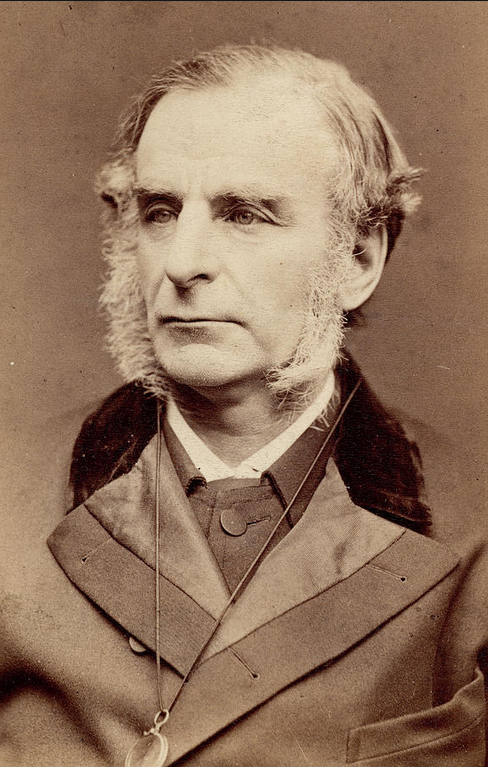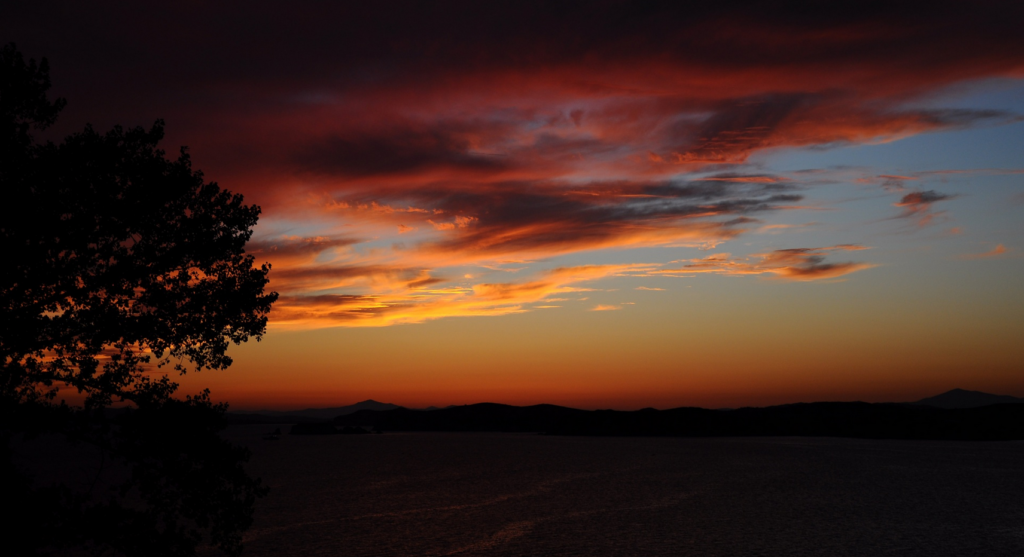Editor’s note: The following is extracted from The Gospel of the Pentateuch: A Set of Parish Sermons, by Charles Kingsley (published 1863).
_________________________________________________________________
Deut. viii. 11-18. Beware that thou forget not the Lord thy God, in not keeping His commandments, and His judgments, and His statutes, which I command thee this day: lest when thou hast eaten and art full, and hast built goodly houses, and dwelt therein; and when thy herds and thy flocks multiply, and thy silver and thy gold is multiplied, and all that thou hast is multiplied; then thine heart be lifted up, and thou forget the Lord thy God, which brought thee forth out of the land of Egypt, from the house of bondage; who led thee through that great and terrible wilderness, wherein were fiery serpents, and scorpions, and drought, where there was no water; who brought thee forth water out of the rock of flint; who fed thee in the wilderness with manna, which thy fathers knew not, that He might humble thee and that He might prove thee, to do thee good at thy latter end: and thou say in thine heart, My power and the might of mine hand hath gotten me this wealth. But thou shall remember the Lord thy God: for it is He that giveth thee power to get wealth, that He may establish his covenant which He sware unto thy fathers, as it is this day.
__________________________________________________________________
I told you before that the book of Deuteronomy was the foundation of all sound politics—as one would expect it to be, if its author were Moses, the greatest lawgiver whom the world ever saw. But here, in this lesson, is a proof of the truth of what I said. For here, in the text, is Moses’ answer to the first great question in politics, What makes a nation prosperous?
To that wise men have always answered, as Moses answered, ‘Good government; government according to the laws of God.’ That alone makes a nation prosperous.
But the multitude—who are not wise men, nor likely to be for some time to come—give a different answer. They say, ‘What makes a nation prosperous is its wealth. If Britain be only rich, then she must be safe and right.’
To which Moses, being a wise lawgiver, and having, moreover, in him the Spirit of the Lord who knoweth what is in man, makes a reasonable, liberal, humane answer.
Moses does not deny that wealth is a good thing. He does not bid them not try to be rich. He takes for granted that they will grow rich; that the national fruit of their good government will be that they will increase in cattle and in crops and in money, and in all which makes an agricultural people rich.
He takes for granted, I say, that these Jews will grow very rich; but he warns them that their riches, like all other earthly things, may be a curse or a blessing to them. Nay, that they are not good in themselves, but mere tools which may be used for good or for evil. He warns them of a very great danger that riches will bring on them. And herein he shows his knowledge of the human heart; for it is a certain fact that whenever any nation has prospered, and their flocks and herds, and silver and gold, all that they had, have multiplied, then they have, as Moses warned the Jews, forgotten the Lord their God, and said, ‘My power and the might of my hand hath gotten me this wealth.’
And it is true, also, that whenever any nation has begun to say that, they have fallen into confusion and misery, and sometimes into utter ruin, till they repented, and turned and remembered the Lord their God, and found out that the strength of a nation did not consist in riches, but in virtue. For it is He that giveth the power to get wealth. He gives it in two ways: First, God gives the raw material; secondly, He gives the wit to use it.
You will all agree that God gives the first; that He gives the soil, the timber, the fisheries, the coal, the iron.
Do you believe it? I hope and trust that you do. But I fear that now-a-days many do not; for they boast of the resources of Britain as if we ourselves had made Britain, and not Almighty God; as if we had put the coal and the iron into the rocks, and not Almighty God ages before we were born.
And if they will not say that openly, at least they will say, ‘But the coal, and iron, and all other raw material would have been useless, if it had not been for the genius and energy of the British race.’
Of course not. But who gave them that genius and energy? Who gave them the wit to find the coal and iron?
God; and God gave it to us when we needed it, and not before.
Think of this, I beseech you; for it is true, and wonderful, and a thing of which I may say, ‘Come, and I will reason with you of the righteous acts of the Lord.’
Men say, ‘As long as England is ahead of the world in coal and iron she may defy the world.’ I do not believe it; for if she became a wicked nation all the coal and iron in the universe would not keep her from being ruined.
But even if it were true, which it is not, that the strength of Britain lies in coal and iron, and not in British hearts, what right have we to boast of coal and iron?
Did our forefathers know of them when they came into this land? Did they come after coal and iron?
Not they. They came here to settle as small yeomen; to till miserable little patches of corn, of which we should be now ashamed, and to feed cattle on the moors, and swine in the forests—and that was all they looked to. Then they found that there was iron, principally down south, in Sussex and Surrey; and they worked it, clumsily enough, with charcoal; and for more than twelve hundred years they were here in England, with no notion of the boundless wealth in iron and coal lying together in the same rocks which God had provided for them; or if they did guess at it, they could not use it, because they could not work deep mines, being unable to pump out the water; for God had not opened their eyes and shown them how to do it.
But just when it was wanted, God did show them. About the middle of the last century the iron in the Weald was all but worked out; the charcoal wood was getting scarcer and scarcer, and there was every chance that England, instead of being ahead of all nations in iron, would have fallen behind other nations; and then where should we have been now?
But, just about one hundred years ago, it pleased God to open the eyes of certain men, and they invented steam-engines. Then they could pump the mines, then they could discover and use the vast riches of our coal-mines. Then, too, sprung up a thousand useful arts and manufactures; while the land, not being wanted for charcoal and firewood, as of old, could be cleared of wood, and thousands of acres set free to grow corn. Population, which had been all but standing still, without increasing, has now more than doubled, and wealth inestimable has come to this generation, of which our forefathers never dreamed.
Now what have we to boast of in that? What, save to confess ourselves a very stupid race, who for twelve hundred years could not discover, or at least use the boundless wealth which God had given us, because we had not wit enough to invent so simple a thing as a steam-engine.
All we should do, instead of boasting, is to bless God that He revealed to us just what we needed, and at the very time at which we needed it, and confess that it is He that giveth us power to get wealth. It is He that hath made us, and not we ourselves.
Look again at another case, even more extraordinary, which has happened during our own times—indeed within the last ten years—the discovery of gold in Australia.
There had been rumours and whispers of gold for years before; and yet no one looked for gold, cared for it, hardly believed in it. God had dulled their understanding and blinded their eyes for some good purpose of His own. That is what the Bible would have said of such a matter, and that is what we should say.
And at last some man finds lying out upon the downs a huge lump of gold—by accident (as men call it; by the special providence of God, as they ought to call it); and at that every one starts up and awakes, and begins looking for gold. And now that their eyes are opened, behold! the gold is everywhere. Not merely in lonely forests and unexplored mountains, but on farms where the sheep have been pastured for years past; ay, even Melbourne streets were full of gold, under the feet of the passengers and the wheels of the carriages; there had the gold been all along, but men could not see it till God opened their eyes. Verily, verily, God is great, and man is small. I do not say that this was a miracle in the common meaning of the word; but I do say that this was a striking instance of that everlasting and special providence of the living God, who ordereth all things in heaven and earth, from the rise of a nation to the fall of a sparrow; and does so, not by breaking His own laws, but by making His laws work exactly as He will, when He will, and where He will; and I say that it is a fresh proof of the great saying, that no man can see a thing unless God shows it to him. For it is the Lord who gives us power to get wealth. It is He that hath made us, and not we ourselves; and in Him we live and move, and have our being.
This, then, was what Moses commanded—to remember that they owed all to God. What they had, they had of God’s free gift. What they were, they were by God’s free grace. Therefore they were not to boast of themselves, their numbers, their wealth, their armies, their fair and fertile land. They were to make their boast of God, and of God’s goodness.
He that gloried was to glory in the Lord, and confess that a Syrian ready to perish was their father Jacob, when the Lord had mercy on him, and made him the head of a great tribe, and the father of a great nation; that not themselves, but God had brought them out of Egypt with signs and wonders; that they got not the land in possession by their own bow, neither was it their own sword that helped them, but that God had driven out before them nations greater and mightier than they.
This they were to remember, because it was true. And this we are to remember, because it is more or less true of us. God has put us where we are. God has made of us a great nation; God has discovered to us the immense riches of this land. It is He that hath made us, and not we ourselves.
But more. You will see that Moses warns them that if they forget God, the Lord who brought them out of the land of Egypt, they would go after other gods.
He cannot part the two things. If they forget that God brought them out of Egypt, they will turn to idolatry, and so end in ruin.
Now why was this?
Why should not the Jews have gone on worshipping one God, even if they had forgotten that he brought them out of the land of Egypt?
Some people now-a-days think that they would, and that they might have very well been what is called Monotheists, without believing all the story of the signs and wonders in Egypt, and the passage of the Red Sea, and the giving of the law to Moses.
Such men may be very learned; but there is one thing of which they know very little, and that is, human nature. Moses knew human nature; and he knew that if men forgot that God was the living God, the acting God, who had helped them once, and was helping them always, and only believed about there being one God far away in heaven, and not two, that that sort of dead faith in a dead God would never keep them from idols. They would want gods who would help them, who would hear their prayers, to whom they could feel gratitude and trust; and they would invent them for themselves, and begin to worship things in the heavens above, and the earth beneath, because they had forgotten their true friend and helper, the living God.
And so shall we. If we forget that God is the living God, who brought our forefathers into this land; who has revealed to us the wealth of it step by step, as we needed it; who is helping and blessing us now, every day and all the year round—then we shall begin worshipping other gods.
I do not mean that we shall worship idols, though I do not see why our children’s children should not do so a few hundred years hence if we teach them to forget the living God. There are too many Christians at this day who worship saints, and idols of wood and stone; and so may our descendants do—or do even worse.
But we ourselves shall begin—indeed we are doing it too much already—worshipping the so-called laws of nature, instead of God who made the laws, and so honouring the creature above the Creator; or else we shall worship the pomps and vanities of this world, pride and power, money and pleasure, and say in our hearts, ‘These are our only gods which can help us—these must we obey.’ Which if we do, this land of England will come to ruin and shame, as surely as did the land of Israel in old time.
If we do not believe in the living God, we shall believe in something worse than even a dead god.
For in a dead god—a god who does nothing, but lets mankind and the world go their own way—no man nor nation ever will care to believe.
And now, nay dear friends, remember that a nation is, after all, only the people in that nation: you, and I, and our neighbours, and our neighbours’ neighbours, and so forth; and that therefore, in as far as we are wrong, we do our worst to make the British nation wrong. If we give way to ungodly pride and self-sufficiency, then we are injuring ourselves; and not only that, but injuring our neighbours and our children after us, as far as we can. And therefore our duty is, if we wish well to our nation, not to judge our neighbour, nor our neighbour’s neighbour, but to judge ourselves.
If we go on trusting in ourselves rather than God; if we keep within us the hard self-sufficient spirit, and boast to ourselves (though we may be ashamed to boast to our neighbours), ‘My power and the strength of my hands have got me this and that;’ and in fact live under the notion, which too many have, that we could do very well without God’s help if God would let us alone—then we are heaping up ruin and shame for ourselves and for our children after us. Ruin and shame, I say. We are apt to forget how easy and common it is for God to turn the wisdom of men into folly; to frustrate the tokens of the liars, and make the prophets mad. How men blow great bubbles, and God bursts them with the slightest touch. How, when all seems well, and men cry peace and safety, sudden destruction comes upon them unawares. How, when men say, ‘Soul, take thine ease, eat, drink, and be merry; thou hast much goods laid up for many years,’ God answers, ‘Thou fool, this night shall thy soul be required of thee.’
My friends, we see God doing thus in these very days by great nations, by great branches of industry. Look at the American war, look at the Manchester cotton famine, and see how God can confound the strong and cunning, and blind their eyes to the ruin which is coming till it is come in all its might. And then think, if it be so easy for Him to confound such as them, is it less easy for Him to confound you and me, if we begin to fancy that we can do without Him, and ask, ‘Doth God perceive it? Or is there knowledge in the Most High? We are they that ought to speak. Who is Lord over us?’
Yes, in this sense God is indeed a jealous God, who will not give His honour to another. And a blessed thing for men it is that God is a jealous God, that He will punish us for trusting in anything but Him—will punish us for trusting in ourselves, or in our wisdom, or in wealth, or in science, or in armies and navies, or in constitutions and laws; in anything, in short, save the living God.
For if He left us alone to go our own way without trusting or fearing Him, we should surely go down and down (as the Chinese seem to have gone down), generation after generation, till we became only a mere cunning and spiteful sort of animals, hateful and hating one another. But when we are chastened for our folly, we are chastened by Him that we may be partakers of His holiness; that we may be His children, looking up to Him as our Father, from whom comes every good and perfect gift; the Father of Lights, with whom is no variableness or shadow of turning; and who therefore will and can give us, His children, light, more and more to understand those His invariable and eternal laws, by which He has made earth and heaven; who has given us His Son Jesus Christ our Lord, and will with Him likewise freely give us all things.










